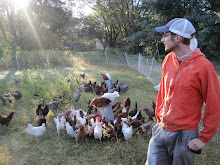

Elliott
New farmers. Old values.










The recipients of the 2010 Eli Segal Award are Arianne McGinnis and Elliott McGann of Hope Grows. Hope Grows is a modest organic farm located in Sylvania, Georgia. Hope Grows places value on the transparency of farming methods and philosophy, and having the community involved in their sustainability and growth. The relationships that Arianne and Elliott have not only helped the farm grow, but have also brought a new perspective to the community. Unlike many large farms in the area, Hope Grows does not use chemicals, antibiotics, or heavy machinery.
“We produce pasture raised poultry, pork, and organic vegetables, but our business is healing: the land, the food, the economy, the community”
The farmers at Hope Grows sell the products of their hard work at their farm store and local farmers’ markets. Oftentimes these outlets are used as an opportunity to spread the word on ecologically conscious farming. The farm is also open to visits throughout the year, and holds two large on-farm events in the spring and fall. Pictures, commentary, and video of their work is displayed at www.freshfarming.blogspot.com. Here you can learn how to clip a chicken’s wings, start a garden, or even process your own Thanksgiving turkey! Recently a group of students from Georgia Southern University were dubbed the “Pasture Clearing Brigade” by the Fresh Farming blog. A group of students lent a helping hand to the Hope Grows farm by weeding the overgrown pasture. To answer the question “Why not use a tractor and do it in five minutes?”, it is explained that those at Hope Grows are “too averse to debt and mechanically challenged to invest in a tractor.” It also inhibits pasture growth and diversity. Instead the Hope Grows farm made some new friends, and encouraged individuals in the community to participate.
“We view farming as activism for restoring healthy communities, and find it spiritually and economically rewarding to establish direct relationships with our eaters as often as possible”
With their $5,000 grant, Hope Grows hopes to build upon their mission to provide “local food access, education, skills training, and rural community development” through a small-scale poultry processing facility. Off-site processing currently adds considerably to the cost of Hope Grows' products. Therefore, by having their own processing facility, Hope Grows will provide more families access to the healthy products they have to offer.